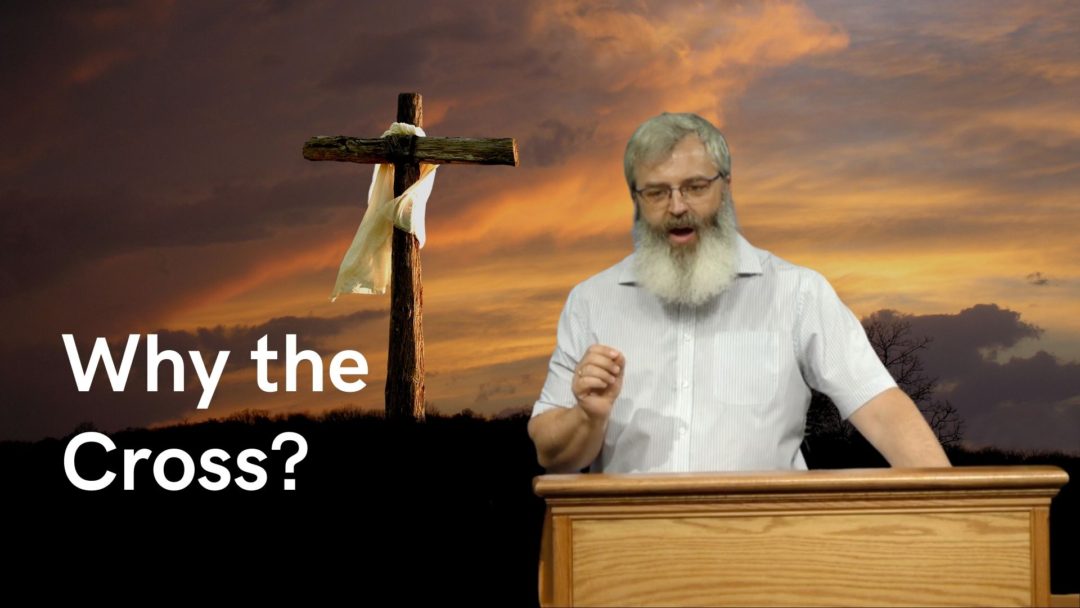A crossless Christianity
I’m thankful for the strength of many churches in the US but at the same time I realize that we live in a time of great challenge and opposition to the church. In these times it’s more important than ever to get the vital issues right. You see, opposition doesn’t come out of nowhere, it is often formed over years and even decades of slowly eroding theology and weakening faith in the Gospel of Jesus Christ.
Podcast: Play in new window | Download (Duration: 24:09 — 44.7MB) | Embed
One of Oprah Winfrey’s favorite theologians and author of the book “The Universal Christ”, Father Richard Rohr says:
“I believe that Jesus’ death on the cross is a revelation of the infinite and participatory love of God, not some bloody payment required by God’s offended justice to rectify the problem of sin. Such a story line is way too small and problem-oriented.”
“The theory of substitutionary atonement has inoculated us against the true effects of the Gospel, causing us to largely “thank” Jesus instead of honestly imitating him.”
https://www.oprah.com/own-super-soul-sunday/father-richard-rohr-the-universal-christ
“I’ve always tried to find a deeper inner connection with the purpose that Christ had here on earth,” Margit says. “All my life, I thought it was just for him to die on the cross for my sins. But I now recognize that Jesus actually taught me Christ consciousness.
https://www.oprah.com/oprahshow/awaken-your-spirit_1/all#ixzz6z028Riua
I want to talk to you about the cross today because, unfortunately, the cross has quietly crept to the sidelines in many churches. We have ended up with a sort of crossless Christianity. It may have cross symbols but there’s failure to see the real need for the gory details of sin, death and the suffering it causes. A crossless Christianity will often be big on practical needs, personal improvement and social activism, and weak on personal guilt, the holiness of God and the need for repentance.
“Before we can begin to see the cross as something done for us, we have to see it as something done by us.”
John Stott
Primarily a crossless Christianity is a Christianity without sacrifice, because, quite frankly, the need is not seen or felt.
Chernobyl
Story of Chernobyl. In order to stop the radiation from continuing to poison the air there had to be sacrifice. No machine could do the job of those firefighters who went out on the roof to shovel off the chunks of radioactive material. Their sacrifice saved the lives of others.
There are many similarities to the cross of Christ and the Chernobyl nuclear accident. For one we can’t physically see what is doing so much harm. Because this many people try to downplay the dangerous effects. “
1Co 1:18
18 For the message about the cross is nonsense to those who are being destroyed, but it is God’s power to us who are being saved.
The cross of Christ is considered foolishness by many because they don’t recognize the danger they are in. They fail to see what sin is and how much destruction it is causing. They don’t understand God’s holiness and that he must punish sin in order to remain holy.
When we talk about the cross, we are speaking about 3 historical facts which have profound theological impact.
- Jesus’ voluntary death (sacrificial and substitutionary)
- his burial and
- his bodily resurrection.
3 For I delivered to you as of first importance what I also received: that Christ died for our sins in accordance with the Scriptures, 4 that he was buried, that he was raised on the third day in accordance with the Scriptures,
1Co 15:3-4
The truth of these events is the basis upon which Christianity is built, upon which our understanding of salvation, forgiveness, and eternal life is found.
Here are 5 reasons why the cross of Christ is vital.
1. The cross protects God’s holiness
The cross had a Godward aspect and a manward aspect, however, we don’t often discuss the Godward aspect although it is the primary reason for the cross.
The idea of sacrifice for sins and protection of God’s holiness can be seen from the earliest Scriptures. When Adam and Eve sinned something had to be done, there had to be a temporary fix in order for them to have some sort of ongoing relationship with the holy God. God provided this temporary fix through the sacrifice of an animal. This animal provided Adam and Eve a covering for their naked bodies. This was a symbol of their sin and the fact that they tried to hide themselves from God. Now they would need to be temporarily hidden from God’s presence until a complete solution could be offered.
21 And the LORD God made for Adam and for his wife garments of skins and clothed them.
Gen 3:21
Adam and Eve were then expelled from the Garden because of their sin they could no longer enjoy an unhindered relationship with a holy God.
Again when God initiated a relationship with the people of Israel, he put many boundaries and limits upon this relationship in order to protect them and to protect his holiness.
We see these limits very clearly in the building of the tabernacle, a place of worship for God’s people. The entire layout communicates the idea of God’s holiness and the need for there to be limits on who has access to God’s presence.
33 And you shall hang the veil from the clasps, and bring the ark of the testimony in there within the veil. And the veil shall separate for you the Holy Place from the Most Holy.
Exo 26:33
2 and the LORD said to Moses, “Tell Aaron your brother not to come at any time into the Holy Place inside the veil, before the mercy seat that is on the ark, so that he may not die. For I will appear in the cloud over the mercy seat.
Lev 16:2
These key symbols pictured how serious God is about his holiness. The curtain or veil separated the ark of the covenant from the people. They knew that they had no right to enter into the holy presence of God. Even if they had offered the necessary sacrifices, they were not holy enough to be in God’s presence, there was still the defiling presence of sin in their hearts. Only the priest could enter the holy of holies once on the day of atonement once the sacrifice had been offered for the people.
When Jesus died on the cross we see something significant happen, the veil that protected God’s holiness from man’s uncleanliness and protected man from God’s holiness is ripped apart.
The veil is torn!
And Jesus cried out again with a loud voice and yielded up his spirit. 51 And behold, the curtain of the temple was torn in two, from top to bottom. And the earth shook, and the rocks were split.
Mat 27:50-51
Now man can go into the holy of holies, he can once again have fellowship with God because of the perfect sacrifice of Jesus Christ.
19 Therefore, brothers, since we have confidence to enter the holy places by the blood of Jesus, 20 by the new and living way that he opened for us through the curtain, that is, through his flesh, 21 and since we have a great priest over the house of God,
Heb 10:19-21
The better we understand the power and purity of God’s holiness the more we will value the cross and the more we will be in awe of this great privilege God has given us through faith in Jesus to enter into the holy of holies without harm to ourselves.
2. The cross provides man with complete forgiveness
Nearly all religions will have some way for man to cleanse himself from impurity or sins.
- Hindus bathe themselves in the Ganges
- Muslims perform Wudu, washing of the hands, face, and feet
- Jews also wash their hands and their entire bodies
All of these washing must be repeated, they are temporary, and they all must be done by the individual himself.
11 And every priest stands daily at his service, offering repeatedly the same sacrifices, which can never take away sins. 12 But when Christ had offered for all time a single sacrifice for sins, he sat down at the right hand of God,
Heb 10:11-12
Christ’s death on the cross gives us the only true and permanent solution to our impurity. In this Christianity is unique among the religions of the world. Christ provides a way for us to be cleansed from our sins that is permanent and that is outside of ourselves. No one can wash their own sins away because they are impure themselves. Imagine trying to clean a dirty rag using nothing but the dirty rag itself. You can’t do it, you need something else to come and remove the dirt from it. You need something clean to effectively remove impurities from something uncleant. This is what Jesus did for us.
15 For we do not have a high priest who is unable to sympathize with our weaknesses, but one who in every respect has been tempted as we are, yet without sin.
Heb 4:15
God protected his holiness by giving man the opportunity to cleanse himself from sin, not temporarily through the sacrifice of an animal, through the repetition of a prayer, or through any other act that you or I can do. God provides us with a forgiveness that is full and complete, that forgives past, present and future sins. A forgiveness that is found by faith in Christ and remains with us for eternity.
3. The cross provides man with the righteousness of Christ
To forgive is one thing but God did much more than that with the cross. The cross not only makes us innocent but it also makes us righteous in God’s eyes. God’s holiness is not just about avoiding sin, it’s not just about refraining to do something you know you shouldn’t do. No, God’s righteousness is far greater than that.
Illustration of marriage: In order to understand why innocence isn’t enough for God we can think of it in terms of marriage. Imagine a young man and a young woman are dating. The woman turns to the young man and asks him. “Do you love me?” he responds by saying, “Well I don’t hate you, I have no ill feelings toward you, I’ve never done anything to harm you.” You can imagine the response of the poor girl, “but do you love me!?” she would say. Then she would probably tell him, “It’s not enough to simply refrain from hating me or doing harm to me, if you want me to marry you and you want to live together, then you must love me!”
For God to be with us, for him to really live with us and in us, he needs more than us refraining from sin, he needs more than a lack of impurity, he needs us to be righteous because he is righteous, he needs us to be righteous on a heart level.
Thankfully the cross makes provision for the kind of righteousness God wants from us.
21 But now the righteousness of God has been manifested apart from the law, although the Law and the Prophets bear witness to it— 22 the righteousness of God through faith in Jesus Christ for all who believe. For there is no distinction: 23 for all have sinned and fall short of the glory of God, 24 and are justified by his grace as a gift, through the redemption that is in Christ Jesus, 25 whom God put forward as a propitiation by his blood, to be received by faith. This was to show God’s righteousness, because in his divine forbearance he had passed over former sins.
Rom 3:21-25
If you shave a dog and dress him like a man, put shoes on his back legs, make him stand upright and put eyeglasses on, he’ll still just bark like a dog because he’s got dog on the inside.
If you dress up man in all kinds of rules, laws, principles, and religious traditions, he may look very holy to you, he may impress some people who have never seen him at 6 AM just after he rolled out of bed but he still has sinful man on the inside, you can’t change that, keeping those laws can’t change that, he can’t change that, no one can change that except for Christ!
No one ever became righteous through the law, it’s impossible.
21 For our sake he made him to be sin who knew no sin, so that in him we might become the righteousness of God.
2Co 5:21
Jesus had to adhere to the whole law of God because the redemption He brought was not accomplished solely by His death on the cross. God did not send Jesus to earth on Good Friday so He could go straight to the cross. Jesus not only had to die for our sins, but also had to live for our righteousness. If Jesus had only died for our sins, His sacrifice would have removed all of our guilt, but that would have left us merely sinless in the sight of God, not righteous.
The Work of Christ: What the Events of Jesus’ Life Mean for You pg 71
R. C. Sproul
4. The cross proves God’s love
Unfortunately many people today spend their entire lives searching for true love, they look for someone who will accept their love, they look for someone who will return their love, they look for someone who will remain faithful to them. How sad it is that many never find this love! And yet this love is there for everyone, it’s nearer than many people know. The deepest and truest love is found in Jesus, it’s found on the cross, it’s found in his sacrifice for me and for you!
For one will scarcely die for a righteous person—though perhaps for a good person one would dare even to die— but God shows his love for us in that while we were still sinners, Christ died for us.
Rom 5:7-8
The cross is an invitation to accept God’s offer of love. His love is broad and it is extended to all who respond in faith. Yet, his love is exclusive, he doesn’t give it out where it is not accepted, where it is not believed.
We must also note that God’s love is an initiating love, it’s the love that starts the relationship. God didn’t respond to our love for him but rather we respond to God’s love for us.
In this the love of God was made manifest among us, that God sent his only Son into the world, so that we might live through him. 10 In this is love, not that we have loved God but that he loved us and sent his Son to be the propitiation for our sins.
1Jo 4:9-10
God initiated love toward you and me by sending his only son to die. This is the greatest sacrifice ever. No one else could make this sacrifice except for God the Father. His love found action in Christ’s sacrifice. His love is true love because it didn’t stop when the going got tough. His love is true love because it is not dependent upon our emotions, or even upon our obedience. His love is true love because it is eternal and sacrificial.
24 Then Jesus told his disciples, “If anyone would come after me, let him deny himself and take up his cross and follow me. 25 For whoever would save his life will lose it, but whoever loses his life for my sake will find it.
Mat 16:24-25
We live in a consumer society. Brands make us offers, they promise us health, happiness, better experiences, better taste, more fun, etc… We live our whole lives as consumers, choosing the products that give us the best results for our money. We then put down the cash, make our purchase and wait to see if this new product will live up to our expectations!
5. The cross presents us with an example to follow
Some approach the cross in the same manner, they want to try it on in the fitting rooms before they will really believe. They want to see what it will do for them. They want to know if it’s worth their investment. They don’t see the cross as a life to live but rather at a slight improvement to their already somewhat decent life. They’ll start going to church, and doing some Christian things if it means their life will become more comfortable. However, if things don’t work out they can always return it and get their money back.
If we simply take the cross for our own benefit and move on with our life waiting for the benefits of the cross to kick in then we have lost the meaning of the cross entirely.
This is called “cheap grace”.
Cheap grace is preaching forgiveness without repentance; it is baptism without the discipline of community; it is the Lord’s Supper without confession of sin; it is absolution without personal confession. Cheap grace is grace without discipleship, grace without the cross, grace without the living, incarnate Jesus Christ. Costly grace is the hidden treasure in the field, for the sake of which people go and sell with joy everything they have.[5] [31]It is the costly pearl, for whose price the merchant sells all that he has;[6] it is Christ’s sovereignty, for the sake of which you tear out an eye if it causes you to stumble.[7] It is the call of Jesus Christ which causes a disciple to leave his nets and follow him.[8] Costly grace is the gospel which must be sought again and again, the gift which has to be asked for, the door at which one has to knock.[9] It is costly, because it calls to discipleship; it is grace, because it calls us to follow Jesus Christ. It is costly, because it costs people their lives; it is grace, because it thereby makes them live. It is costly, because it condemns sin; it is grace, because it justifies the sinner. Above all, grace is costly, because it was costly to God, because it costs God the life of God’s Son—“you were bought with a price”[10]—and because nothing can be cheap to us which is costly to God. Above all, it is grace because the life of God’s Son was not too costly for God to give in order to make us live.
-Discipleship DBW Vol 4 (Dietrich Bonhoeffer Works) pg 44
Jesus was careful to present the cross not only as a means for salvation but also as an example and way of life to be followed.
When we don’t understand the value of the cross we end up with cheap grace
What does the cross mean for you?
- The cross of Christ means you can have forgiveness and salvation
- Faith in Christ and his work on the cross removes the impurity of our sins and gives us the promise of eternal life with God.
- The cross of Christ means you can live a life of thanksgiving and grace
- Faith in Christ and his work on the cross allows me to enter into a life of thanksgiving and grace.
- I am thankful to God for his grace in my life and this shows in every aspect of my life.
- My relationships are seasoned with the grace God had given me.
- My outlook on life is changed to one of thanksgiving, worship, and praise.
- The cross of Christ means you are ready to sacrifice all for the sake of Christ
- Sacrifice takes on a whole new meaning when you realize that you are doing it for the sake of Christ
- Sacrifice is no longer avoided at all cost but seen as a means through which God can use you, grow you, and through which you can glorify him.
Podcast: Play in new window | Download (Duration: 24:09 — 44.7MB) | Embed











